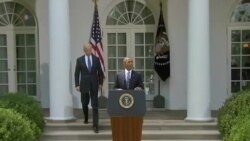WHITE HOUSE —
As the White House continues to make the case to U.S. lawmakers that Congress should approve military action against Syria's government, President Obama met Monday with two key Republican senators whose support will be crucial.
On national security matters, especially those involving the Middle East, President Obama has often consulted with Senator John McCain, whom he defeated in the 2008 presidential election.
McCain and fellor Republican Lindsey Graham are among lawmakers who for more than two years have urged a stronger U.S. response to the Syrian civil war, and now to the August 21 chemical attack in Damascus.
In what he called a "candid" exchange with the president, McCain said he emphasized the importance of degrading the Assad regime's capabilities, and upgrading those of Syrian rebels.
"We do want an articulation of a goal that over time will degrade Bashar al-Assad's capabilities, increase and upgrade the capabilities of the Free Syrian Army and the Free Syrian government so that they can reverse the momentum on the battlefield that is presently not in their favor because they have not received the assistance that they need," said McCain.
Graham spoke of a "consensus" being formed to strengthen the opposition while degrading the Assad government.
"I am hopeful that over the coming days we will learn more about this strategy of degrading and upgrading, and that when the vote comes we can go on the floor of the Senate and say the administration has a plan apart from a limited military action that will allow us to get to where we need to go as a nation, which is to deter Iran from a nuclear weapons march and to stabilize the region before it's too late," said Graham.
Neither elaborated on how they believe Obama will lay out an enhanced strategy.
McCain said the administration will have to work very hard to persuade skeptical Americans, including reassuring there will be no U.S. boots on the ground. He reiterated his concern about the effects of Congress voting down a use of force resolution.
"The consequences would be catastrophic in that the credibility of this country with friends and adversaries alike would be shredded, and it would be not only implications for this presidency but for future presidencies as well," he said.
McCain called what he heard Monday from Obama "encouraging," but said he wants to hear "concrete plans and details" explaining how next steps will differ from the past administration approach on Syria.
Asked if they discussed with Obama the hardening of Syrian defenses during any delay, McCain said he has been given "some reason to believe that very serious [military] strikes may take place, as opposed to cosmetic."
The meeting, and ongoing briefings for lawmakers, are part of an aggressive administration effort to reduce skepticism among members of both parties about the purpose and effectiveness of any attack.
Secretary of State John Kerry and Defense Secretary Chuck Hagel are to testify before the Senate Foreign Relations Committee on Tuesday.
Congress formally returns to work on September 9.
In other developments, Russian Foreign Minister Sergey Lavrov called U.S. evidence of the alleged chemical weapons use by the Syrian regime as "absolutely unconvincing.''
However, in Paris a government source said a French intelligence report on the chemical attack last month concludes that there was "massive use of chemical agents" and that Syrian forces were responsible.
In an interview with the French newspaper Le Figaro, President Bashar al-Assad said military strikes against Syria could trigger "a regional war" and spread "chaos and extremism."
Assad dismissed Obama administration and French intelligence findings, saying the U.S. and France have been "incapable" of providing proof of Syrian government responsibility.
Latest images from Syria:
On national security matters, especially those involving the Middle East, President Obama has often consulted with Senator John McCain, whom he defeated in the 2008 presidential election.
McCain and fellor Republican Lindsey Graham are among lawmakers who for more than two years have urged a stronger U.S. response to the Syrian civil war, and now to the August 21 chemical attack in Damascus.
In what he called a "candid" exchange with the president, McCain said he emphasized the importance of degrading the Assad regime's capabilities, and upgrading those of Syrian rebels.
"We do want an articulation of a goal that over time will degrade Bashar al-Assad's capabilities, increase and upgrade the capabilities of the Free Syrian Army and the Free Syrian government so that they can reverse the momentum on the battlefield that is presently not in their favor because they have not received the assistance that they need," said McCain.
Graham spoke of a "consensus" being formed to strengthen the opposition while degrading the Assad government.
"I am hopeful that over the coming days we will learn more about this strategy of degrading and upgrading, and that when the vote comes we can go on the floor of the Senate and say the administration has a plan apart from a limited military action that will allow us to get to where we need to go as a nation, which is to deter Iran from a nuclear weapons march and to stabilize the region before it's too late," said Graham.
Neither elaborated on how they believe Obama will lay out an enhanced strategy.
McCain said the administration will have to work very hard to persuade skeptical Americans, including reassuring there will be no U.S. boots on the ground. He reiterated his concern about the effects of Congress voting down a use of force resolution.
"The consequences would be catastrophic in that the credibility of this country with friends and adversaries alike would be shredded, and it would be not only implications for this presidency but for future presidencies as well," he said.
McCain called what he heard Monday from Obama "encouraging," but said he wants to hear "concrete plans and details" explaining how next steps will differ from the past administration approach on Syria.
Asked if they discussed with Obama the hardening of Syrian defenses during any delay, McCain said he has been given "some reason to believe that very serious [military] strikes may take place, as opposed to cosmetic."
The meeting, and ongoing briefings for lawmakers, are part of an aggressive administration effort to reduce skepticism among members of both parties about the purpose and effectiveness of any attack.
Secretary of State John Kerry and Defense Secretary Chuck Hagel are to testify before the Senate Foreign Relations Committee on Tuesday.
Congress formally returns to work on September 9.
In other developments, Russian Foreign Minister Sergey Lavrov called U.S. evidence of the alleged chemical weapons use by the Syrian regime as "absolutely unconvincing.''
However, in Paris a government source said a French intelligence report on the chemical attack last month concludes that there was "massive use of chemical agents" and that Syrian forces were responsible.
In an interview with the French newspaper Le Figaro, President Bashar al-Assad said military strikes against Syria could trigger "a regional war" and spread "chaos and extremism."
Assad dismissed Obama administration and French intelligence findings, saying the U.S. and France have been "incapable" of providing proof of Syrian government responsibility.
Latest images from Syria:







